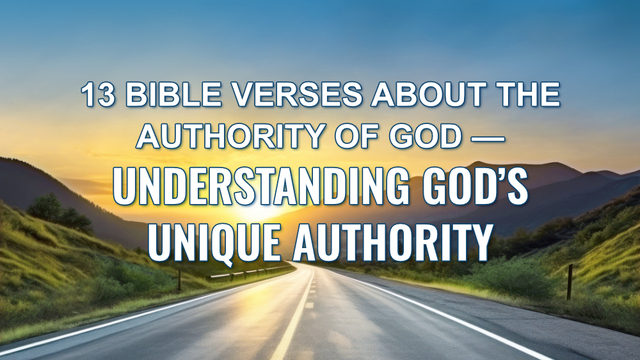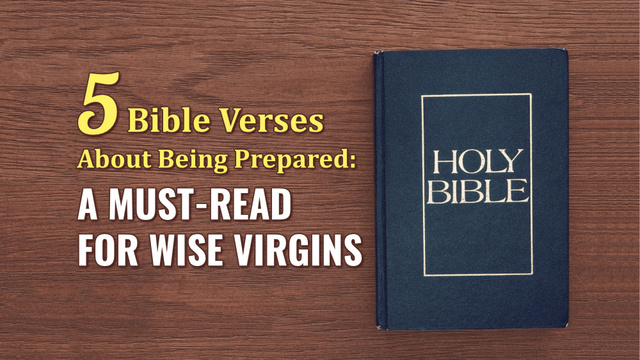13 Bible Verses About the Authority of God - Understanding God’s Unique Authority
While many acknowledge the unique authority of God, few truly comprehend its profound manifestation. This limited understanding often hinders individuals from developing genuine confidence to rely on the immense power of God’s authority in times of adversity. By delving into the following Bible verses about God’s authority and relevant words of God, you will gain profound insights from 4 perspectives, deepening your understanding of God’s unparalleled authority.

1. Understanding the Authority of God Through His Creation of All Things With His Word
“And God said, Let there be light: and there was light. And God saw the light, that it was good: and God divided the light from the darkness. And God called the light Day, and the darkness He called Night. And the evening and the morning were the first day” (Genesis 1:3–5).
“And God said, Let there be a firmament in the middle of the waters, and let it divide the waters from the waters. And God made the firmament, and divided the waters which were under the firmament from the waters which were above the firmament: and it was so” (Genesis 1:6–7).
“And God said, Let the waters under the heaven be gathered together to one place, and let the dry land appear: and it was so. And God called the dry land Earth; and the gathering together of the waters called He Seas: and God saw that it was good” (Genesis 1:9–10).
“And God said, Let the earth bring forth grass, the herb yielding seed, and the fruit tree yielding fruit after his kind, whose seed is in itself, on the earth: and it was so” (Genesis 9:11).
“And God said, Let there be lights in the firmament of the heaven to divide the day from the night; and let them be for signs, and for seasons, and for days, and years: And let them be for lights in the firmament of the heaven to give light on the earth: and it was so” (Genesis 1:14–15).
“And God said, Let the waters bring forth abundantly the moving creature that has life, and fowl that may fly above the earth in the open firmament of heaven. And God created great whales, and every living creature that moves, which the waters brought forth abundantly, after their kind, and every winged fowl after his kind: and God saw that it was good” (Genesis 1:20–21).
“And God said, Let the earth bring forth the living creature after his kind, cattle, and creeping thing, and beast of the earth after his kind: and it was so. And God made the beast of the earth after his kind, and cattle after their kind, and every thing that creeps on the earth after his kind: and God saw that it was good” (Genesis 1:24–25).
Relevant Words of God
From when He commenced the creation of all things, the power of God began to be expressed and revealed, for God used words to create all things. Regardless of in what manner He created them, regardless of why He created them, all things came into being and stood fast and existed because of the words of God; this is the unique authority of the Creator. In the time before mankind appeared in the world, the Creator used His power and authority to create all things for mankind, and employed His unique methods to prepare a suitable living environment for mankind. All that He did was in preparation for mankind, who would soon receive His breath. This is to say, in the time before mankind was created, the authority of God was shown forth in all creatures different from mankind, in things as great as the heavens, the lights, the seas, and the land, and in those as small as animals and birds, as well as in all sorts of insects and microorganisms, including various bacteria invisible to the naked eye. Each was given life by the words of the Creator, each proliferated because of the words of the Creator, and each lived under the sovereignty of the Creator because of His words. Although they did not receive the breath of the Creator, they still showed forth the vitality of life bestowed upon them by the Creator through their different forms and structures; although they did not receive the ability to speak given to mankind by the Creator, they each received a way of expressing their life that was bestowed upon them by the Creator, and which differed from the language of man. The authority of the Creator not only gives the vitality of life to seemingly static material objects, so that they will never disappear, but He also gives the instinct to reproduce and multiply to every living being, so that they will never vanish, and so that, generation after generation, they will pass on the laws and principles of survival endowed to them by the Creator. The manner in which the Creator exerts His authority does not rigidly adhere to a macro or micro viewpoint, and is not limited to any form; He is able to command the operations of the universe and hold sovereignty over the life and death of all things, and, moreover, He is able to maneuver all things so that they serve Him; He can manage all the workings of the mountains, rivers, and lakes, and rule all things within them, and, beyond that, He is able to provide that which is needed by all things. This is the manifestation of the unique authority of the Creator amongst all things besides mankind. Such a manifestation is not just for a lifetime; it will never cease, nor rest, and it cannot be altered or damaged by any person or thing, nor can it be added to or reduced by any person or thing—for none can replace the identity of the Creator, and, therefore, the authority of the Creator cannot be replaced by any created being; it is unattainable by any non-created being. Take God’s messengers and angels for example. They do not possess the power of God, much less the authority of the Creator, and the reason why they do not have the power and authority of God is because they are not possessed of the essence of the Creator. The non-created beings, such as God’s messengers and angels, although they can do some things on behalf of God, cannot represent God. Although they possess some power not possessed by man, they do not possess the authority of God, they do not possess the authority of God to create all things, to command all things, and to hold sovereignty over all things. So, the uniqueness of God cannot be replaced by any non-created being, and, similarly, the authority and power of God cannot be replaced by any non-created being. In the Bible, have you read of any messenger of God that created all things? Why did God not dispatch any of His messengers or angels to create all things? It is because they did not possess the authority of God, and so they did not possess the ability to exert the authority of God. Just like all creatures, they are all under the sovereignty of the Creator, and under the authority of the Creator, and so in the same way, the Creator is also their God and their Sovereign. Among each and every one of them—whether they be noble or lowly, of great or minor power—there is not one which can surpass the authority of the Creator, and so among them, there is not one which can replace the identity of the Creator. They shall never be called God, and shall never be able to become the Creator. These are immutable truths and facts!
—The Word, Vol. 2. On Knowing God. God Himself, the Unique I
2. Understanding the Authority of God Through His Covenant With Humanity With His Word
“And I will establish My covenant with you, neither shall all flesh be cut off any more by the waters of a flood; neither shall there any more be a flood to destroy the earth” (Genesis 9:11).
“And God said, This is the token of the covenant which I make between Me and you and every living creature that is with you, for perpetual generations: I do set My bow in the cloud, and it shall be for a token of a covenant between Me and the earth” (Genesis 9:12–13).
Relevant Words of God
In the Scriptures it is said that “I do set My bow in the cloud, and it shall be for a token of a covenant between Me and the earth.” These are the original words spoken by the Creator to mankind. As He said these words, a rainbow appeared before the eyes of man, and it has remained there until this very day. Everyone has seen such a rainbow, and when you see it, do you know how it appears? Science is incapable of proving it, or of locating its source, or identifying its whereabouts. That is because the rainbow is a sign of the covenant established between the Creator and man; it requires no scientific basis, it was not made by man, nor is man capable of altering it. It is a continuation of the Creator’s authority after He spoke His words. The Creator used His own particular method to abide by His covenant with man and His promise, and so His use of the rainbow as a sign of the covenant that He had established is a heavenly edict and law that shall remain forever unchanged, whether in regard to the Creator or the created mankind. This immutable law is, it must be said, another true manifestation of the Creator’s authority following His creation of all things, and it must be said that the authority and power of the Creator are limitless; His use of the rainbow as a sign is a continuation and extension of the Creator’s authority. This was another act performed by God using His words, and was a sign of the covenant that God had established with man using words. He told man of that which He resolved to bring about, and in what manner it would be fulfilled and achieved. In this way the matter was fulfilled according to the words from God’s mouth. Only God is possessed of such power, and today, several thousand years after He spoke these words, man can still look upon the rainbow spoken from the mouth of God. Because of those words uttered by God, this thing has remained unaltered and unchanged right up until today. None can remove this rainbow, none can change its laws, and it exists solely for the words of God. This is precisely the authority of God. “God is as good as His word, and His word will be accomplished, and that which He accomplishes lasts forever.” Such words are clearly manifested here, and it is a clear sign and characteristic of the authority and power of God. Such a sign or characteristic is not possessed by or seen in any of the created beings, nor is it seen in any of the non-created beings. It belongs only to the unique God, and distinguishes the identity and essence possessed only by the Creator from that of the creatures. At the same time, it is also a sign and characteristic that, apart from God Himself, can never be surpassed by any created or non-created being.
God’s establishment of His covenant with man was an act of great importance, one that He intended to use to communicate a fact to man and tell man His will. To this end He employed a unique method, using a special sign to establish a covenant with man, a sign which was a promise of the covenant that He had established with man. So, was the establishment of this covenant a great event? Just how great was it? This is exactly what is so special about the covenant: It is not a covenant established between one man and another, or one group and another, or one country and another, but a covenant established between the Creator and the whole of mankind, and it shall remain valid until the day that the Creator abolishes all things. The executor of this covenant is the Creator, and its maintainer is also the Creator. In short, the entirety of the rainbow covenant established with mankind was fulfilled and achieved according to the dialogue between the Creator and mankind, and has remained so right up until today. What else can the creatures do apart from submit to, obey, believe, appreciate, witness, and praise the authority of the Creator? For none but the unique God is possessed of the power to establish such a covenant. The appearance of the rainbow, time and time again, is an announcement to mankind and calls his attention to the covenant between the Creator and mankind. In the continual appearances of the covenant between the Creator and mankind, what is demonstrated to mankind is not a rainbow or the covenant itself, but the immutable authority of the Creator. The recurring appearance of the rainbow demonstrates the tremendous and miraculous deeds of the Creator in hidden places, and, at the same time, is a vital reflection of the Creator’s authority that will never fade away, and will never change. Is this not a display of another aspect of the Creator’s unique authority?
—The Word, Vol. 2. On Knowing God. God Himself, the Unique I
3. Understanding the Authority of God Through His Blessing Upon Humanity
“As for Me, behold, My covenant is with you, and you shall be a father of many nations. Neither shall your name any more be called Abram, but your name shall be Abraham; for a father of many nations have I made you. And I will make you exceeding fruitful, and I will make nations of you, and kings shall come out of you” (Genesis 17:4–6).
“Abraham shall surely become a great and mighty nation, and all the nations of the earth shall be blessed in him. For I know him, that he will command his children and his household after him, and they shall keep the way of Jehovah, to do justice and judgment; that Jehovah may bring on Abraham that which He has spoken of him” (Genesis 18:18–19).
“By Myself have I sworn, said Jehovah, for because you have done this thing, and have not withheld your son, your only son: That in blessing I will bless you, and in multiplying I will multiply your seed as the stars of the heaven, and as the sand which is on the sea shore; and your seed shall possess the gate of his enemies; And in your seed shall all the nations of the earth be blessed; because you have obeyed My voice” (Genesis 22:16–18).
Relevant Words of God
First let us look at Genesis 17:4–6: “As for Me, behold, My covenant is with you, and you shall be a father of many nations. Neither shall your name any more be called Abram, but your name shall be Abraham; for a father of many nations have I made you. And I will make you exceeding fruitful, and I will make nations of you, and kings shall come out of you.” These words were the covenant that God established with Abraham, as well as God’s blessing of Abraham: God would make Abraham the father of nations, would make him exceedingly fruitful, and would make nations of him, and kings would come of him. Do you see the authority of God in these words? And how do you see such authority? Which aspect of the essence of God’s authority do you see? From a close reading of these words, it is not hard to discover that the authority and identity of God are clearly revealed in the wording of God’s utterances. For example, when God says “My covenant is with you, and you shall … have I made you … I will make you…,” phrases such as “you shall” and “I will,” whose wording bears the affirmation of God’s identity and authority, are, in one respect, an indication of the Creator’s faithfulness; in another respect, they are special words used by God, who possesses the identity of the Creator—as well as being part of conventional vocabulary. If someone says they hope another person will be exceedingly fruitful, that nations will be made from them, and that kings shall come from them, then that is undoubtedly a kind of wish, not a promise or a blessing. So, people dare not say “I will make you such and such, you shall such and such,” for they know that they do not possess such power; it is not up to them, and even if they say such things, their words would be empty nonsense, driven by their desire and ambition. Does anyone dare to speak in such a grand tone if they feel that they cannot accomplish their wishes? Everyone wishes well for their descendants, and hopes that they will excel and enjoy great success. “What great fortune it would be for one of them to become emperor! If one were to be a governor that would be good, too—just as long as they’re someone important!” These are all people’s wishes, but people can only wish blessings upon their descendants, and cannot fulfill or make any of their promises come true. In their hearts, everyone clearly knows that they do not possess the power to achieve such things, for everything about them is beyond their control, and so how could they command the fate of others? The reason why God can say words like these is because God possesses such authority, and is capable of accomplishing and realizing all the promises that He makes to man, and of making all the blessings that He bestows upon man come true. Man was created by God, and for God to make someone exceedingly fruitful would be child’s play; to make someone’s descendants prosperous would require but a word from Him. He would never have to work Himself into a sweat for such a thing, or task His mind, or tie Himself in knots over it; this is the very power of God, the very authority of God.
After reading “Abraham shall surely become a great and mighty nation, and all the nations of the earth shall be blessed in him” in Genesis 18:18, can you feel the authority of God? Can you sense the extraordinariness of the Creator? Can you sense the supremacy of the Creator? The words of God are certain. God does not say such words because of, or in representation of, His confidence in success; they are, instead, proof of the authority of God’s utterances, and are a commandment that fulfills the words of God. There are two expressions that you should pay attention to here. When God says “Abraham shall surely become a great and mighty nation, and all the nations of the earth shall be blessed in him,” is there any element of ambiguity in these words? Is there any element of concern? Is there any element of fear? Because of the words “shall surely” and “shall be” in God’s utterances, these elements, which are particular to man and often exhibited in him, have never borne any relation to the Creator. No one would dare to use such words when wishing others well, no one would dare to bless another with such certainty as to give them a great and mighty nation, or promise that all the nations of the earth shall be blessed in him. The more certain the words of God, the more that they prove something—and what is that something? They prove that God has such authority, that His authority can accomplish these things, and that their accomplishment is inevitable. God was certain in His heart, without the slightest hesitation, of all that He blessed Abraham with. Furthermore, the entirety of this would be accomplished in accordance with His words, and no force would be able to alter, obstruct, impair, or disturb its fulfillment. Regardless of what else happened, nothing could abrogate or influence the fulfillment and accomplishment of God’s words. This is the very might of the words uttered from the mouth of the Creator, and the authority of the Creator that does not brook the denial of man! Having read these words, do you still feel doubt? These words were spoken from the mouth of God, and there is power, majesty, and authority in the words of God. Such might and authority, and the inevitability of the accomplishment of fact, are unattainable by any created or non-created being, and unsurpassable by any created or non-created being. Only the Creator can converse with mankind with such a tone and intonation, and facts have proven that His promises are not empty words, or idle boasts, but are the expression of unique authority that is unsurpassable by any person, event, or thing.
—The Word, Vol. 2. On Knowing God. God Himself, the Unique I
Let us look at Genesis 22:17–18. This is another passage spoken by Jehovah God, in which He said to Abraham, “That in blessing I will bless you, and in multiplying I will multiply your seed as the stars of the heaven, and as the sand which is on the sea shore; and your seed shall possess the gate of his enemies; And in your seed shall all the nations of the earth be blessed; because you have obeyed My voice.” Jehovah God blessed Abraham many times that his offspring would multiply—but to what extent would they multiply? To the extent spoken of in Scripture: “as the stars of the heaven, and as the sand which is on the sea shore.” This is to say that God wished to bestow upon Abraham a progeny as numerous as the stars of heaven, and as plentiful as the sand on the sea shore. God spoke using imagery, and from this imagery it is not hard to see that God would not merely bestow one, two, or even just thousands of descendants upon Abraham, but an uncountable number, enough that they would become a multitude of nations, for God promised Abraham that he would be the father of many nations. Now, was that number decided by man, or was it decided by God? Can man control how many descendants he has? Is it up to him? It is not even up to man whether or not he has several, let alone as many as “the stars of the heaven, and as the sand which is on the sea shore.” Who does not wish for their offspring to be as numerous as the stars? Unfortunately, things do not always turn out the way you want. Regardless of how skillful or capable man is, it is not up to him; none can stand outside of that which is ordained by God. However much He allows you, that is how much you shall have: If God gives you a little, then you shall never have a lot, and if God gives you a lot, it is no use resenting how much you have. Is this not the case? All of this is up to God, not man! Man is ruled by God, and no one is exempt!
When God said “I will multiply your seed,” this was a covenant that God established with Abraham, and like the rainbow covenant, it would be accomplished for eternity, and it was also a promise made by God to Abraham. Only God is qualified and capable to make this promise come true. Regardless of whether or not man believes it, regardless of whether or not man accepts it, and regardless of how man views and regards it, all of this shall be fulfilled to the letter, according to the words spoken by God. The words of God will not be altered because of changes in the will or notions of man, and it will not be altered because of changes in any person, event or thing. All things may disappear, but the words of God will remain forever. In fact, the day that all things disappear is exactly the day upon which the words of God are completely fulfilled, for He is the Creator, He possesses the authority of the Creator, the power of the Creator, and He controls all things and all life force; He is able to cause something to come from nothing, or something to become nothing, and He controls the transformation of all things from living to dead; for God, nothing could be simpler than multiplying someone’s seed. This sounds fantastical to man, like a fairytale, but to God, that which He decides and promises to do is not fantastical, nor is it a fairytale. Rather, it is a fact that God has already seen, and which shall surely be accomplished. Do you appreciate this? Do the facts prove that the descendants of Abraham were numerous? How numerous were they? Were they as numerous as “the stars of the heaven, and as the sand which is on the sea shore” spoken of by God? Did they spread across all nations and regions, to every place in the world? Through what was this fact accomplished? Was it accomplished by the authority of God’s words? For several hundreds or thousands of years after the words of God were spoken, God’s words continued to be fulfilled, and were constantly becoming facts; this is the might of God’s words, and proof of the authority of God. When God created all things in the beginning, God said “let there be light,” and there was light. This happened very quickly, was fulfilled in a very short time, and there was no delay in its accomplishment and fulfillment; the effects of God’s words were immediate. Both were a display of God’s authority, but when God blessed Abraham, He allowed man to see another side of the essence of God’s authority, as well as the fact that the Creator’s authority is beyond calculation, and moreover, He allowed man to see a more real, more exquisite side of the Creator’s authority.
—The Word, Vol. 2. On Knowing God. God Himself, the Unique I
4. Understanding the Authority of God Through His Commands to Satan
“And Jehovah said to Satan, Behold, he is in your hand; but save his life” (Job 2:6).
Relevant Words of God
Outwardly, Jehovah God is engaging in a dialogue with Satan. In terms of essence, the attitude with which Jehovah God speaks, and the position in which He stands are higher than Satan. This is to say that Jehovah God is commanding Satan with the tone of an order, and is telling Satan what it should and should not do, that Job is already in its hands, and that it is free to treat Job however it wishes—but that it may not take Job’s life. The subtext is that, although Job has been placed in Satan’s hands, his life is not given over to Satan; no one can take the life of Job from God’s hands unless permitted by God. God’s attitude is clearly articulated in this command to Satan, and this command also manifests and reveals the position from which Jehovah God converses with Satan. In this, Jehovah God not only holds the status of God who created light, and air, and all things and living beings, of the God who holds sovereignty over all things and living beings, but also of the God who commands mankind, and commands Hades, the God who controls the life and death of all living things. In the spiritual world, who apart from God would dare to issue such an order to Satan? And why did God personally issue His order to Satan? Because the life of man, including that of Job, is controlled by God. God did not permit Satan to harm or take the life of Job, and even when God permitted Satan to tempt Job, God still remembered to specially issue such an order, and once again commanded Satan not to take the life of Job. Satan has never dared to transgress the authority of God, and, moreover, has always carefully listened to and obeyed the orders and specific commands of God, never daring to defy them, and, of course, not daring to freely alter any of God’s orders. Such are the limits that God has set out for Satan, and so Satan has never dared to cross these limits. Is this not the might of God’s authority? Is this not a testimony to God’s authority? Satan has a much clearer grasp than mankind of how to behave toward God, and how to view God, and so, in the spiritual world, Satan sees the status and authority of God very clearly, and has a deep appreciation of the might of God’s authority and the principles behind the exertion of His authority. It does not dare, at all, to overlook them, nor does it dare to violate them in any way, or do anything that transgresses the authority of God, and it does not dare to challenge God’s wrath in any way. Though it is evil and arrogant in nature, Satan has never dared to cross the boundaries and limits set out for it by God. For millions of years, it has strictly abided by these boundaries, has abided by every command and order given to it by God, and has never dared to overstep the mark. Though it is malicious, Satan is much wiser than corrupt mankind; it knows the identity of the Creator, and knows its own boundaries. From Satan’s “submissive” actions it can be seen that the authority and power of God are heavenly edicts which cannot be transgressed by Satan, and that it is precisely because of the uniqueness and authority of God that all things change and propagate in an orderly way, that mankind can live and multiply within the course established by God, with no person or object capable of upsetting this order, and no person or object capable of changing this law—for they all come from the hands of the Creator, and from the order and authority of the Creator.
—The Word, Vol. 2. On Knowing God. God Himself, the Unique I
Conclusion
Through the aforementioned 4 aspects, you have gained a fresh understanding of God’s authority, right? Hopefully, this will provide you with the confidence to rely on God during challenging times, enabling you to witness the manifestation of His authority and power in your life experiences. If you desire to delve deeper into your knowledge of God, please don’t hesitate to reach out to us through the online chat window at the bottom of our website. We are always available to share God’s words and communicate with you.








